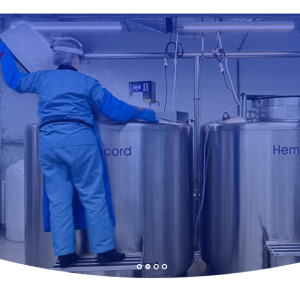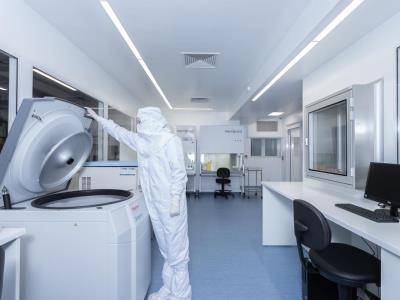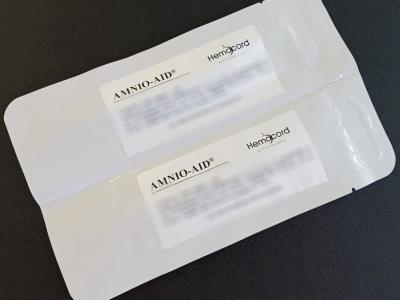Jesteś tutaj
Cord Blood Bank Takes Advantage of Pandemic to Expand Services
 At Hemocord in Brazil, our strategic plan has always aspired to broaden our cryopreservation services, and offer new cellular therapy options to our clients as science evolves and new treatments become available.
At Hemocord in Brazil, our strategic plan has always aspired to broaden our cryopreservation services, and offer new cellular therapy options to our clients as science evolves and new treatments become available.
Therefore, in May 2019, Hemocord Cord Blood Bank transitioned to Hemocord Biotechnology and moved the laboratory into a Biotechnology Park – Tecnosinos – within the University of Vale do Rio dos Sinos, Brazil. The new site included:
- R&D laboratory and team for product development.
- Two cleanroom suites for product processing.
- A bigger cryopreservation storage room.
Less than a year after settling into the new lab and validating new operations, the Coronavirus pandemic hit Brazil. Amidst the uncertainties of a lockdown, its economic consequences, and impacts on the entire logistics system in Brazil, we managed to fully continue our operations. We took advantage of this time and were determined to move forward, working internally to develop new product protocols and to procure licensing that would enable us to expand our services.
After nearly a year of effort, we have received licensing to begin cryopreserving semen for oncology patients. We have also developed a biological wound dressing made of amniotic tissue and have been granted a license as a Tissue Bank.
 For semen cryopreservation, we offer an inventory system to bank the semen in nitrogen tanks with an automated filling system, which is not available in any other human reproduction service in our state, Rio Grande do Sul. Other centers have simple storage cylinders that are dependent on manual filling, and hence subject to liability. After proving the efficiency of our protocol, we obtained a license from ANVISA for Germ Cell and Tissue Banking.
For semen cryopreservation, we offer an inventory system to bank the semen in nitrogen tanks with an automated filling system, which is not available in any other human reproduction service in our state, Rio Grande do Sul. Other centers have simple storage cylinders that are dependent on manual filling, and hence subject to liability. After proving the efficiency of our protocol, we obtained a license from ANVISA for Germ Cell and Tissue Banking.
Developing our biological wound dressing was far more challenging during the pandemic. Several steps in the process depended on outside validation services, such as toxicologic tests of the packaging material, to the imaging techniques to confirm cell viability before and after cryopreservation of the amniotic membrane. This made the process take much longer than planned since several services were on hold or operating through home office only. As the first wave of the coronavirus pandemic passed, we slowly resumed experiments.
 Like the cord blood and the cord tissue, the amniotic membrane that surrounds the fetus in the womb can be collected, processed, and stored for future use. It has unique regenerative and analgesic properties and has been widely researched for wound healing, ranging from burn wounds to wounds caused by vascular disease and diabetes. Under current regulations in Brazil, the only permitted use of amniotic membrane is in ophthalmic surgeries. However, we anticipate that amniotic membrane will soon be approved as a wound dressing for a wider variety of wounds.
Like the cord blood and the cord tissue, the amniotic membrane that surrounds the fetus in the womb can be collected, processed, and stored for future use. It has unique regenerative and analgesic properties and has been widely researched for wound healing, ranging from burn wounds to wounds caused by vascular disease and diabetes. Under current regulations in Brazil, the only permitted use of amniotic membrane is in ophthalmic surgeries. However, we anticipate that amniotic membrane will soon be approved as a wound dressing for a wider variety of wounds.
Hemocord Biotechnology is now the only laboratory in the entire country of Brazil that officially collects, processes, and stores amniotic membrane. After presenting our protocol to the health authorities, we were granted the license of a Tissue Bank. We are currently the only cord blood bank in Brazil to have three licenses that enable us to store practically every human tissue: Cell Processing Center, Tissue Bank, and Germ Cell and Tissue Bank.
Amid this chaotic period of the global pandemic, we can say that the focus on these new developments was a remedy for emotional stress. We are very proud of our team and our achievements and are excited for all that is to come.
Unfortunately, we now find ourselves inside the second wave of COVID-19 infections with the rapid spread of the P1 variant, causing thousands of deaths per day in Brazil and a collapsing health system. Nonetheless, as a company that aims to bring innovation to Brazilian society, we will continue striving to make a difference even in this challenging time.



 Hemocord Biotechnology is a Brazilian company involved in the processing and storage of cord blood, cord tissue, amniotic membrane, bone marrow and semen. The company has a research and development arm for product development. Hemocord also runs a non-profit organization, called
Hemocord Biotechnology is a Brazilian company involved in the processing and storage of cord blood, cord tissue, amniotic membrane, bone marrow and semen. The company has a research and development arm for product development. Hemocord also runs a non-profit organization, called